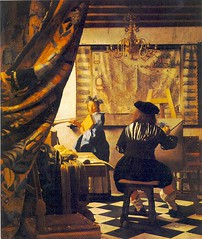
Johannes Vermeer, Allegory of Painting (The Painter In His Studio), 1666
This afternoon I'm working on a brief analysis of the poetry of Charles Baudelaire, one of the most famous French poets, for my World Literature class. The only background I know of him is the two and a half page introduction to just a few of his poems in my anthology, but he and his art are intriguing nonetheless. They say Baudelaire wrote poetry to shock, and so it seems, because even in the 21st century it still does. In his poem "The Carcass," he observes to his female companion that for all her beauty, she will one day end up as the maggot-ridden, half-eaten animal they find on their afternoon stroll, and then she will be hard pressed to "explain to the worms / Who cherish your body so fine, / That I am the keeper for corpses of love / Of the form, and the essence divine!" Encouraging stuff.
I'll post something a bit more palatable of his here. "The Voyage," according to my Norton Anthology of World Masterpieces, is a description of "the opposite of inertia, an active search for goals always out of reach." The "Invitation" summons the reader to "an exotic land of peace, beauty, and sensuous harmony. The voyage is imaginary, of course, implying two forms of escape from reality: an escape out of real time into a primeval accord of the senses, and an escape into another artistic vision--the glowing interiors painted by such Dutch masters as Jan Vermeer."
Invitation to the Voyage
by Charles Baudelaire
translated by Richard Wilbur
My child, my sister, dream
How sweet all things would seem
Were we in that kind land to live together,
And there love slow and long,
There love and die among
Those scenes that image you, that sumptuous weather.
Drowned suns that glimmer there
Through cloud-disheveled air
Move me with such a mystery as appears
Within those other skies
Of your treacherous eyes
When I behold them shining through their tears.
There, there is nothing else but grace and measure,
Richness, quietness, and pleasure.
Furniture that wears
The lustre of the years
Softly would glow within our glowing chamber,
Flowers of rarest bloom
Proffering their perfume
Mixed with the vague fragrances of amber;
Gold ceilings would there be,
Mirrors deep as the sea,
The walls all in an Eastern splendor hung--
Nothing but should address
The soul's loneliness,
Speaking her sweet and secret native tongue.
There, there is nothing but grace and measure,
Richness, quietness, and pleasure.
See, sheltered from the swells
There in the still canals
Those drowsy ships that dream of sailing forth;
It is to satisfy
Your least desire, they ply
Hither through all the waters of the earth.
The sun at close of day
Clothes the fields of hay,
Then the canals, at last the town entire
In hyacinth and gold:
Slowly the land is rolled
Sleepward under a sea of gentle fire.
There, there is nothing but grace and measure,
Richness, quietness, and pleasure.
1 comment:
I have always loved that translation. It is a golden treasure. Thank you for posting this.
Post a Comment